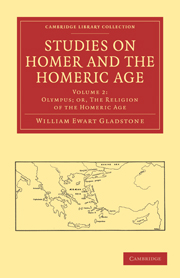Book contents
- Frontmatter
- Contents
- OLYMPUS: OR THE RELIGION OF THE HOMERIC AGE
- SECT. I On the mixed character of the Supernatural System, or Theo-mythology of Homer
- SECT. II The traditive element of the Homeric Theo-mythology
- SECT. III The inventive element of the Homeric Theo-mythology
- SECT. IV The Composition of the Olympian Court; and the classification of the whole supernatural order in Homer
- SECT. V The Olympian Community and its Members considered in themselves
- SECT. VI The Olympian Community and its Members considered in their influence on human society and conduct
- SECT. VII On the traces of an origin abroad for the Olympian Religion
- SECT. VIII The Morals of the Homeric Age
- SECT. IX Woman in the heroic age
SECT. II - The traditive element of the Homeric Theo-mythology
Published online by Cambridge University Press: 05 October 2010
- Frontmatter
- Contents
- OLYMPUS: OR THE RELIGION OF THE HOMERIC AGE
- SECT. I On the mixed character of the Supernatural System, or Theo-mythology of Homer
- SECT. II The traditive element of the Homeric Theo-mythology
- SECT. III The inventive element of the Homeric Theo-mythology
- SECT. IV The Composition of the Olympian Court; and the classification of the whole supernatural order in Homer
- SECT. V The Olympian Community and its Members considered in themselves
- SECT. VI The Olympian Community and its Members considered in their influence on human society and conduct
- SECT. VII On the traces of an origin abroad for the Olympian Religion
- SECT. VIII The Morals of the Homeric Age
- SECT. IX Woman in the heroic age
Summary
The earliest Scriptural narrative presents to our view, with considerable distinctness, three main objects. These are, respectively, God, the Redeemer, and the Evil One. Nor do we pass even through the Book of Genesis without finding, that it shadows forth some mysterious combination of Unity with Trinity in the Divine Nature.
From the general expectation which prevailed in the East at the period of the Advent, and from the prophecies collected and carefully preserved in Rome under the name of the Sibylline books, we are at once led to presume, that the knowledge of the early promise of a Deliverer had not been confined to the Jewish nation. Their exclusive character, and that of their religion; their small significance in the political system and intellectual movement of the world; and the false as well as imperfect notions which seem to have prevailed elsewhere respecting them and their law; all make it highly improbable that these expectations and predictions should have been drawn from them and their sacred books exclusively. Further, Holy Scripture distinctly exhibits to us the existence of channels of traditional knowledge severed from theirs. Thus much we learn particularly from the cases of Job, who was a prophet and servant of God, though he lived in a country where idolatry was practised; and of Balaam, who, not being an Israelite, nor an upright man, was nevertheless a prophet also. Our Lord, in his answer respecting God as the God of Abraham, points to a great article of belief, not expressly propounded in the Mosaic books.
- Type
- Chapter
- Information
- Studies on Homer and the Homeric Age , pp. 39 - 172Publisher: Cambridge University PressPrint publication year: 2010First published in: 1858



